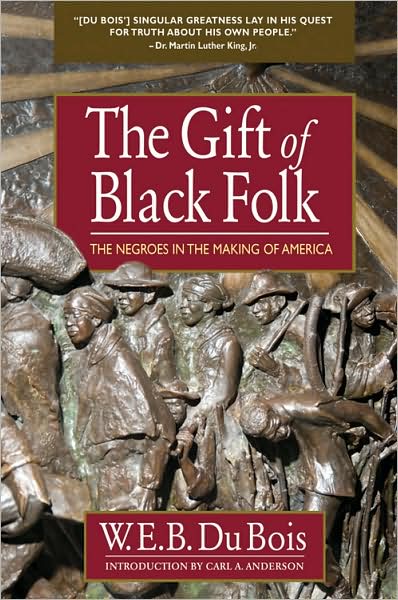*** A REVISED EDITION OF THE W. E. B. DU BOIS CLASSIC ***
COMMISSIONED BY THE KNIGHTS OF COLUMBUS
(1.4 MILLION MEMBERS WORLDWIDE)
Although the Civil War marked an end to slavery in the United States, it would take another fifty years to establish the country’s civil rights movement. Dr. W.E.B. Du Bois was among the first generation of African-American scholars to spearhead this movement towards equality. As cofounder of the NAACP, he sought to initiate equality through social change, and as a talented writer, he created books and essays that provide a revealing glimpse into the black experience of the times. In The Gift of Black Folk—one of Du Bois' most important works—he recounts the remarkable history of African Americans and their many unsung contributions to American society.
Commissioned by the Knights of Columbus Historical Commission and produced in 1924 at the height of the country's Black Renaissance, The Gift of Black Folk represents one of the first critically acclaimed black histories. In it, Dr. Du Bois chronicled the role of blacks in the early exploration of America, the crucial parts they played in developing the country’s agricultural industry, and the courage they displayed on the many battlefields of our young nation. He documented their creative genius in virtually every aspect of American culture—music, painting, sculpture, literature, theater, and invention. He also highlighted the unique contributions of black women, proposing the idea that their freedom could lead to freedom for all women.
The year 2009 marked two important events: the one-hundred-year anniversary of the founding of the NAACP, and the inauguration of the country's first African-American president. How timely that The Gift of Black Folk is now back in print, providing a powerful picture of the struggles that paved the way for freedom and equality in our nation.
William Edward Burghardt Du Bois, a gifted writer, scholar, sociologist, historian, and activist, became the first African-American to receive a PhD from Harvard University in 1895. An exponent of full equality for African- Americans, Du Bois was a cofounder of the Niagara Movement, which became the National Association for the Advancement of Colored People (NAACP) in 1909. A leading voice of the black community, Dr. Du Bois’ teachings, writings, and lectures provided a platform for his views that prompted action and change. Until his death in 1963, W.E.B. Du Bois led a passionate life of ceaseless energy and purposeful writing.
Table of Contents
Foreword
Introduction
Prescript
1. The Black Explorers
2. Black Labor
3. Black Soldiers
4. The Emancipation of Democracy
5. The Reconstruction of Freedom
6. The Freedom of Womanhood
7. The American Folk Song
8. Negro Art and Literature
9. The Gift of the Spirit
Postscript
The Racial Contributions to the United States
Notes
The Gift of Black Folk - "(Du Bois') singular greatness lay in his quest for truth about his own people."
Introduction
Once in a great while a book comes out that truly changes the way people look at an important issue. Such was the case in 1924 with the publication of W.E.B. DuBois’ book The Gift of Black Folk: The Negroes in the Making of America.
In its review of the book in August 1924, the Oakland Tribune declared: “The book is one of the most valuable contributions to American literature published in a decade, the result of which should create a better understanding among the races. It proves that Negroes (sic) have the right to be considered and treated as American citizens.”
Today, more than four decades after the Civil Rights Act passed in 1964 – with African Americans having served on the Supreme Court for decades, as Secretary of State for nearly a decade, and now as President of the United States – the statement made by the Oakland Tribune seems more than obvious. However, four decades before the Civil Rights Act, in 1924, the fact that African Americans were full citizens and should be considered as such would have seemed revolutionary to many Americans. Jim Crow laws littered the books in many states, segregated schools were often the norm, and American students and readers were often led by the revisionist historians of the day to believe that white Protestant men were the only heroes in American history. Catholic, Jewish, and especially African Americans had no place on the historical timeline popular in the early 20th century.
Both despite – and because of – such widespread bigotry, one organization took up the cause of racial and religious minorities in the United States, seeking to add to the historical record of this country the important pieces that had been previously neglected. That organization was the Knights of Columbus.
As Catholics, the Knights of Columbus knew first-hand about prejudice and discrimination. The Knights were founded in Connecticut in 1882 at a time when Catholics had only recently gained the right to vote in that state, and when those who practiced the Catholic faith routinely faced discrimination, especially in employment. Things hadn’t improved much by the 1920s. A resurgent Ku Klux Klan targeted – in addition to African Americans – Jews and Catholics. At the Klan’s instigation, Oregon passed a law, targeted at Catholics, which outlawed private religious schools. With the financial support of the Knights, the law was ultimately appealed to the U.S. Supreme Court, where it was struck down. The year The Gift of Black Folk was published was also the year that Al Smith, a Catholic, and a member of the Knights of Columbus, first ran for the presidency. When nominated as the Democratic party’s candidate for president four years later, in 1928, Smith would face the hatred and the fiery crosses of the Klan as his train travelled to campaign stops in Oklahoma.
It is small wonder that Catholics felt a common cause with those religious and ethnic minorities that were hated even more than Catholics themselves. In 1921, in the face of widespread bigotry, the Knights of Columbus adopted a resolution at its annual convention establishing a “Historical Commission,” which would seek to counter the revisionist history so widespread at the time, and to add to the historical record, the individual and collective achievements of members of minority groups. Overseeing the project was Edward McSweeney, who had served as assistant U.S. Commissioner of Immigration at Ellis Island from 1893 to 1902.
In all, three books would be published by the Historical Commission. In addition to The Gift of Black Folk, the Knights’ Historical Commission would also publish The Jews in the Making of America, by George Cohen, and The Germans in the Making of America by Dr. Frederick Schrader. In addition to anti-black racism, both anti-Semitism, and, with World War I and its aftermath, anti-German sentiment were serious issues in the United States at that time.
Even in 1924, taking a broad and visionary view on racial issues was not something new for the Knights of Columbus. The History of Knights of Columbus, written by William O’Neill and published in 1897, tells the story of the creation of Philip Sheridan Council 119 of Southboro, Mass. Before joining the Knights and forming a council, the men of Southboro had been constituted as the John Boyle O’Reilly literary society, and had elected and African American man as its president. O’Neill pointed this out and wrote that the men of Southboro were “in this act reflecting the principles of the Catholic church (sic), which recognizes all colors and races as the children of God.”
Then, during World War I, the Knights ran the “Army Hut” program, a forerunner of the USO (United Service Organizations). Knights administered centers that provided for the care and comfort of the troops on military bases in the United States and in France.
After the war, a book was published in 1919 that had special praise for the manner in which the Knights of Columbus handled racial issues. The American Negro in the Great War was authored by Emmet J. Scott, an African American who also served as special adjutant to the U.S. Secretary of War. Of the contribution of the Knights, he wrote: “Another organization was of much service in making Negro soldiers comfortable at the front. This was the Knights of Columbus, a Catholic society, which has to its credit that, unlike the other social welfare organizations operating in the war, it never drew the color line.”
So it was that in 1924, it was only natural for the Knights of Columbus to take up the cause of bringing to light the long-neglected record of achievement of African Americans. To write this book, the Knights’ Historical Commission sought out the most pre-eminent African American scholar of the day, the first black man to have received a Ph.D. from Harvard, W.E.B. DuBois. DuBois was passionate both about civil rights and about “Black History.” Martin Luther King, Jr. would later say of DuBois: “His singular greatness lay in his quest for truth about his own people.”
What DuBois produced in The Gift of Black Folk was a book that provided an extensive chronicle of African American achievements and contributions to United States. The book helped set the stage for the many books on African American history that would follow.
Today, DuBois’ book continues to have significant value and relevance. Though great progress has been made in the area of racial understanding, there continues to be ignorance of African American history. Sadly, too many Americans still believe that “Black History” consists of slavery, sharecropping, Jim Crow laws, the civil rights movement, and finally increasing acceptance and achievement at every level of society and government in the United States. What that sort of understanding misses, is exactly what DuBois filled in. From the earliest colonial times forward, DuBois recounts the stories of African American individuals and groups, who concretely contributed to the development of the United States.
There are several achievements in the history of the Knights of Columbus – an organization I have led since 2000 – that give me and our 1.75 million members a justifiable pride in our past. This book, and the Knights ability – decades before the civil rights movement – to see beyond the racist stereotypes, the hatred and the fear of African Americans, book is one of these gems in our history.
Now, 85 years after this book was first published, and 100 years after DuBois and several others founded the NAACP, the republication of this book presents us with an opportunity to look back in order to look forward better. Only in understanding the great achievements of African Americans, in the face of overwhelming obstacles, can we understand how far we have come as a nation, living at a time when an American of any color or race can aspire to any position in our great nation. This book, as an achievement of its own in the furthering of racial understanding and as a compilation of the achievements of an entire race of people, is a classic that will continue to provide readers with a more complete picture of American history, and the contributions to that history, at every stage, by African Americans.





